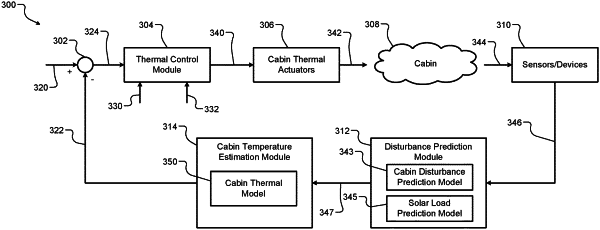| CPC G01C 21/3492 (2013.01) [B60W 40/08 (2013.01); G01C 21/3461 (2013.01); G01C 21/3484 (2013.01); B60W 2040/0872 (2013.01)] | 19 Claims |

|
1. A solar loading-based system comprising:
a memory configured to store a cabin thermal load model of an interior cabin of a host vehicle and a solar load prediction model;
a disturbance prediction module configured to
receive signals indicative of states of cabin thermal actuators and one or more comfort metrics, and
predict an effect of solar loading over a known portion of a predicted route including predicting cabin temperatures based on the solar load prediction model, the states of the cabin thermal actuators, and the one or more comfort metrics, wherein the cabin temperatures refer to different regions within the interior cabin, and wherein the predicted effect of solar loading on the cabin temperatures of the different regions and over the predicted route is based on different predicted locations of a solar energy source relative to the host vehicle along a route;
a cabin temperature estimation module configured, based on the cabin thermal load model, to determine a first comfort metric of the one or more comfort metrics based on the predicted cabin temperatures; and
a thermal control module configured to control a plurality of cabin thermal actuators to adjust cabin states, including the first comfort metric, to respective target values based on the predicted effect of solar loading over the known portion of the predicted route,
wherein the cabin temperature estimation module is configured to implement a cabin thermal actuator energy model that i) when predicted solar load is to remain the same for a period of time, performs a range extension operation including ignoring solar load predictions for the period of time to increase range of the host vehicle, and ii) when predicted solar load is to change, account for the change in the solar load by changing control logic to satisfy constraints.
|